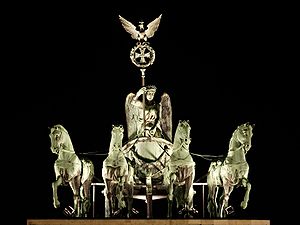- Portal:European Union
-
- Wikipedia portals:
- Culture
- Geography
- Health
- History
- Mathematics
- Natural sciences
- People
- Philosophy
- Religion
- Society
- Technology
Main page Institutions Competences History of treaties Member States Categories The European Union Portal IntroductionThe European Union (EU) is an economic and political union of 27 countries located primarily in Europe, with a population of over 500 million people. It traces its origins from the European Coal and Steel Community, which was created after World War 2 to bind together the economies of its six founding countries, in the hopes of making another European war impossible. It was incorporated into a new organisation, the European Economic Community, in 1958, which was the basis for today's European Union.
Over the decades since its creation, the EU has grown in size through a process of enlargement, where countries seek to join the EU, and in power through the gradual expansion of its role into new policy areas. In 2009 the Charter of Fundamental Rights, which enshrines certain political, social, and economic rights for EU citizens, was was made legally binding on all EU states.
The EU operates above the national level but is more than just an international organisation. Some areas of lawmaking are made solely by the EU's independent institutions, while other areas are made through negotiation between member states. Important institutions of the EU include the European Commission, the Council of Ministers, the European Council and the European Court of Justice. The European Parliament is the EU's legislative body and is elected every five years by EU citizens.
A key focus of the EU's role is the single market, a trade bloc in which all member states apply the same set of laws, and which ensures the free movement of people, goods, services, and capital. Examples of this are the passport-free Schengen area, the Erasmus student exchange programme and a common currency, the euro. The EU's other roles include making laws on justice and home affairs, and maintaining common policies on trade, agriculture, fishing, the environment and regional development. The EU has also created the Common Foreign and Security Policy, which gives it a limited role in European defence and foreign policy. It has its own diplomatic service and is represented at the United Nations, WTO, G8 and G-20.
Selected article
West Wycombe Park is a country house near the village of West Wycombe in Buckinghamshire, England. Built between 1740 and 1800 as a pleasure palace for the decadent 18th-century libertine and dilettante Sir Francis Dashwood, the house is long and rectangular, and all four façades are columned and pedimented, three theatrically so. The house combines and encapsulates the entire progression of British 18th-century architecture from early idiosyncratic Palladian to the Neoclassical, although anomalies in the design of the house make it architecturally unique. It is in an 18th-century landscaped park, surrounded by smaller temples that act as satellites to the greater temple, the house.
The house was given to the National Trust in 1943 by Sir John Dashwood, 10th Baronet (1896–1966), an action strongly resented by his heir. Dashwood retained ownership of the contents of the house, much of which he sold; after his death, the house was restored at the expense of his son, Sir Francis Dashwood. Today, while the structure is owned by the National Trust, the house is the home of Sir Edward Dashwood and his family. The house is open to the public during the summer months and a venue for civil weddings and corporate entertainment, which help to fund its maintenance and upkeep.
Selected city
Madrid is the capital of Spain, and the largest city in Spain. It is located on the river Manzanares in the center of the country, between the Autonomous Communities of Castilla y Leon and Castilla la Mancha. Madrid is also the capital of the Community of Madrid, an uniprovincial Autonomous Community. Due to its geographical location, wealth and history, Madrid is considered one of the financial centers of the Iberian Peninsula, together with Lisbon, and the political center of Spain.
As the capital of the former Spanish Empire, Madrid is a city of great cultural and political importance. While Madrid possesses a modern infrastructure, it has preserved the look and feel of many of its historic neighborhoods and streets. Its landmarks include the huge Royal Palace of Madrid; the Buen Retiro park, opened in 1631; an archaeological museum of international reputation; and three superb art museums.
Selected picture

Photo credit: א (Aleph)
Close-up of the quadriga (four-horse chariot) on top of the Brandenburg Gate in Berlin (Germany) at night.Did you know?
- ...that the presidency of the EU Council rotates every half year?
- ...that Greenland is the only territory ever to have left the EU?
- ...that the EU's parliamentary election is the biggest transnational election in the world?
Featured content
Subportals
Related Portals
Europe Eurovision United Nations NATO Brussels ESA Associated Wikimedia
Purge server cache
Categories:- European portals
- WikiProject European Union
Wikimedia Foundation. 2010.








